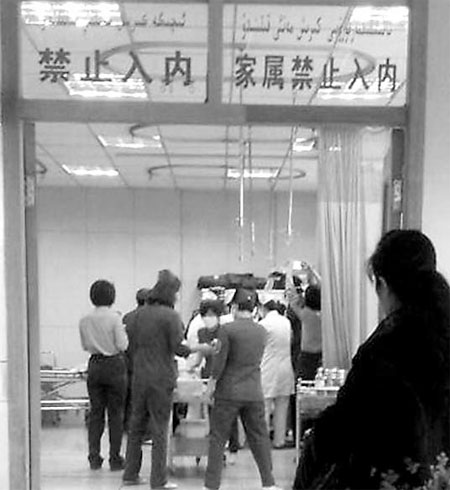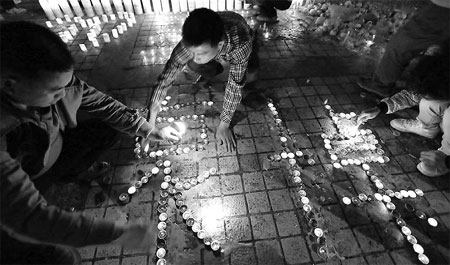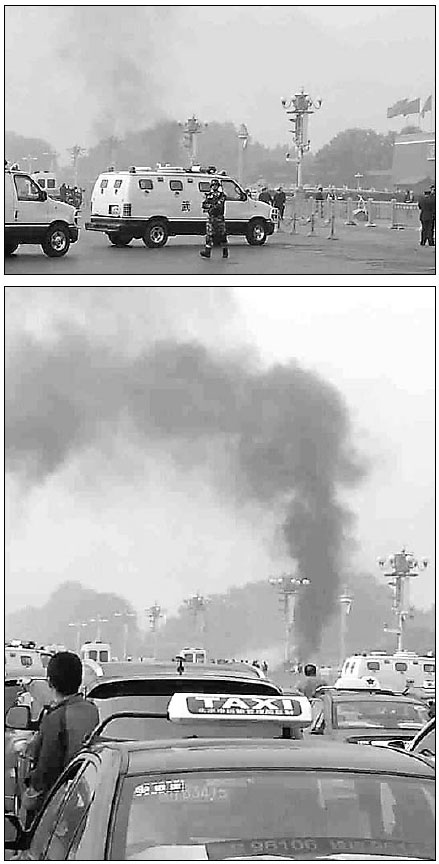Online videos help to spur terror attacks
Updated: 2014-07-08 07:26
By Cao Yin (China Daily USA)
|
||||||||
International cooperation needed to combat dangerous material, Cao Yin reports in Beijing.
Ekrem Usman recalled in subdued tones how members of his terror cell were whipped into a frenzy to carry out a violent attack last year in Lukqun, the Xinjiang Uygur autonomous region.
"Before the attack, we watched some videos that asked us to launch jihad," said the cell's leader, who was sentenced to 25 years in prison in September for membership in a terror organization, homicide and arson.
Rubbing his handcuffed hands, he confirmed he watched online videos repeatedly, sometimes with three or four others.
"I was excited after watching the videos. I was thirsty for jihad," he said, adding he even downloaded the video materials onto his mobile phone.
Like Usman, all of the terrorists had watched similar videos and listened to audio materials on the Internet before they committed brutal terror attacks, the State Internet Information Office said in June.
The SIIO aims to root out terror-related video and audio products online within six months with the cooperation of the Ministry of Public Security and Internet or technology giants such as Sina and Tencent.
Meanwhile, in a 24-minute documentary, made by the SIIO and China Central Television, anti-terrorism experts and police also said that online videos about the East Turkistan Islamic Movement had been a catalyst in a series of attacks since last year.
"How to strengthen the anti-terrorism fight via the Internet has become a major topic not only in China, but also across the world," said specialist Li Wei, who is an anti-terrorism researcher at the China Institutes of Contemporary International Relations and has issued several papers globally on how to tackle the scourge of terror.
International agreements, communication channels, and cooperation are vital in the campaign to tackle terrorism, he said.
Terror groups are no strangers to putting footage of their atrocities on the Internet but it is possible that they could, one day, use the actual web to conduct terror attacks, such as disabling power plants or causing travel mayhem, Li added.
Malice and danger
Yusanjan Wuxuer was sentenced to death for organizing terror attacks and endangering public security on June 16 in Xinjiang's capital, Urumqi.
Along with another four convicted terrorists, he was involved in the planning of driving a car bomb into a crowd at Tian'anmen Square on Oct 28. Three people in the vehicle were killed, as were two others, and 40 people suffered injuries.
"I knew about Usman Asan (a terrorist who killed himself in the attack) by reading books, watching videos and looking for other materials. No one spread the 'idea' (extremist and terrorist ideology) to me," he said.
The five terrorists who were involved in the planning made a video before the attack, screaming that a "holy war" would start and burning flags of various countries, according to the documentary provided by the SIIO.
The attackers' behavior in the video was similar to that in the East Turkistan Islamic Movement, the SIIO said, adding that the number of terrorism-related videos has been increasing in recent years, especially last year.
In 2010 there were eight and in 2011 there were 13 but it rose to 32 in 2012 and soared to 109 in 2013, the SIIO said.
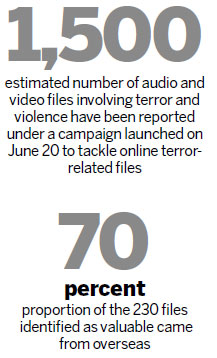
The terror group released 36 such files in the first six months of this year, it said, adding that most of the terror videos were made overseas and uploaded to the Internet from Turkey.
"About 700 versions of the videos were found online, and they have appeared not only on websites but also on mobile phones and memory sticks," a SIIO spokesman said.
The videos advocate terrorism and religious extremism and threaten people if they do not participate in "holy war", the spokesman said, adding that these videos may also intensify ethnic mistrust.
The videos instruct people how to plan and carry out attacks, including how to make explosives and use weapons, and even show successful terror attacks overseas, he said.
"The video makers even praised terrorists after they carried out an attack," he added.
Yalikun Yakuf, deputy director of Xinjiang public security department, echoed this, saying that the methods of terror attacks in China, such as car bombs, mirror those used overseas.
The terrorist videos can poison an impressionable mind and make the viewers lose their humanity, the police said.
Targeting videos
The presence of these terror videos is increasing on some Chinese websites, the SIIO said.
The SIIO launched a campaign to tackle the spread of these videos on June 20, and posted a documentary highlighting the harm they can cause to people who watch them.
More than 30 Web companies signed an agreement on that day to monitor and get rid of such videos within one month and root out related online content in six months.
The Internet enterprises were asked to establish an online center where people with suspicions can contact public security departments.
State-owned telecom giants should also play a key role in preventing the videos from spreading on mobile phones, especially second-hand ones, the SIIO spokesman said.
China has also been strengthening online security since last year and in December the government issued guidelines on combating terror-related videos and audios, while in March such materials were banned in Xinjiang.
Li Wei, the anti-terror expert, praised the campaign, but also stressed the importance of broader global cooperation.
"Cross-border broadcasting and overseas production bases are challenges we face," Li said.
Although the UN has requested that countries improve supervision and crack down on terror, greater cooperation is needed, he said.
Currently video producers make use of the Internet to spread their ideology, but they could cause greater damage if they carried out online terror attacks, he added.
Measures taken
Internet and technology companies are taking action.
The companies have instructed their employees of the danger these videos pose and hold meetings every week to make their campaign against them more effective.
The campaign not only targets websites as the enterprises also delete harmful information on their Twitter-like platforms and instant messaging tools, such as Weibo and WeChat.
Zhao Tian, an employee responsible for tackling terror videos at Sina, one of China's largest Internet giants, said the company had established a specialist group to deal with online terror-related information on March 1, the day terrorists killed 29 civilians and injured another 143 at a railway station in Kunming, Yunnan province.
The group has deleted postings involving religious extremists and more than 800 messages relating to guns and violence, Zhao added.
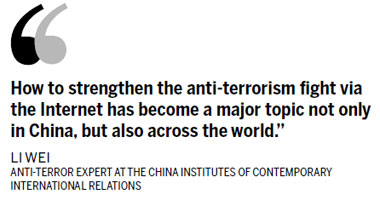
A representative in charge of the video program from Tencent, another large Chinese technology company, echoed Zhao's view, saying her company has added more than 600 employees to boost online security.
"We found people with a better knowledge of the Uygur language and better able to monitor materials uploaded on our websites," the representative said, adding they were also enforcing technical barriers.
But Zhao Danyang, content manager of Youku, China's largest video website, said that his group, about 300 people, still needed authorities to help identify whether a video actually involves terrorists as some may seem, at first glance, to be innocent.
"Some content can be confusing, insofar as it may not actually be apparent if there is a hidden message, so we have to hand it to the Ministry of Public Security," he added.
The anti-terror expert Li Wei agreed, suggesting that the government publish specific definitions of what constitutes terror information and provide more background knowledge and expertise for companies through training.
The more details and requirements we have, the more accurate and effective we will be in tackling terror-related information, he added.
Contact the author at caoyin@chinadaily.com.cn
|
Kunming residents pay their respects to victims of the March 1 attack in the city. Hao Yaxin / for China Daily |
|
A victim receives medical treatment at a local hospital after a terrorist attack in Urumqi on May 22, in which 39 people were killed. Fu Xiaobo / Xinhua |
|
Kunming residents hold a candlelight vigil to mourn victims of the March 1 attack in the city. Liu Jiao / for China Daily |
|
Top and above: A car bomb targeted a crowd at Tian'anmen Square in Beijing on Oct 28, 2013. Three people in the vehicle were killed, as were two others, and 40 people suffered injuries. Photos Provided to China Daily |
(China Daily USA 07/08/2014 page7)

 'God father' of HK art honored for Smithsonian exhibit
'God father' of HK art honored for Smithsonian exhibit
 Grateful blessings
Grateful blessings
 Visitors tour Chinese warships
Visitors tour Chinese warships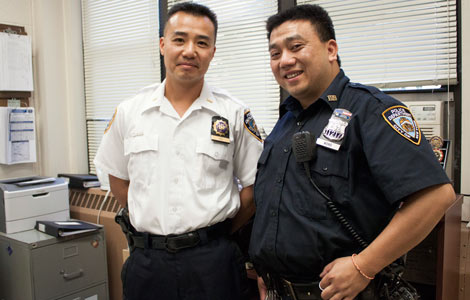
 Chinese-American police officers rise in NYPD
Chinese-American police officers rise in NYPD
 The world in photos: June 30 - July 6
The world in photos: June 30 - July 6
 Chinese navy to join 2014 RIMPAC naval drill
Chinese navy to join 2014 RIMPAC naval drill
 Gettysburg reenactment marks 151st anniversary
Gettysburg reenactment marks 151st anniversary
 Washington splashed with fireworks
Washington splashed with fireworks
Most Viewed
Editor's Picks

|

|

|

|

|

|
Today's Top News
`God father’ of HK art honored for Smithsonian exhibit
Chinese envoy: 'Time is ripe' for BRICS' bank
US south benefitting from China investment
Talks may help US soy exports
Product placement deal transforms into dispute
China approves Lenovo, IBM $2.3b server deal
Meet the new breed of migrant workers
NetJets awaits green light to start China operations
US Weekly

|

|

